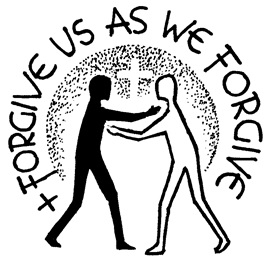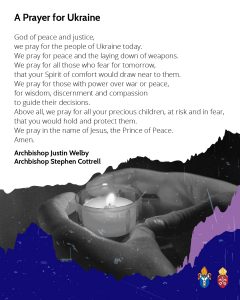A Sermon preached by The Revd Ken Masters at Wincanton on 5th Sunday in Lent, 3 April 2022
Readings: Philippians 34b-141; John 121-8
This sermon is the fifth in our Lent Series on The Lord’s Prayer. Today we look at ‘Thy will be done.
The prayer ‘Thy will be done’ extends the meaning of the two previous phrases. Where God’s Name – where God Himself – is hallowed (held holy); there His Kingdom will come; and His Will shall be done. So, God’s will is done in the context of hallowing His Name and praying for the coming of His Kingdom – rather than being something separate.
Sometimes God’s will is not what we want. Much of the time, of course, we don’t spare a thought for what God’s will may be in a particular situation. Perhaps saying The Lord’s Prayer with more attention may help us to remember that vital question a bit more often.
When we look at the Gospels to see how Jesus himself approached God’s will, then the most obvious – and moving – example is, as I mentioned a month ago, his prayer in the Garden of Gethsemane. Jesus prayed desperately, in the knowledge the crisis was just about to break, when he would be arrested and condemned to a lonely and horrifying death. ‘Abba, Father,’ he said, ‘all things are possible to thee; take this cup away from me. Yet not what I will, but what thou wilt.’ [Mark 1436.] This was a real, heart-wrenching moment of praying –
‘Hallowed be thy name, thy kingdom come, thy will be done.’
There are times when, like our Lord, we’d prefer to avoid God’s will; times when it is hard or painful. There are also times when, despite our best endeavours, we cannot see what God’s will is in a particular situation. God has never promised us an easy or comfortable life. We have to keep on praying. And, eventually – perhaps after a very long time of what has felt like unanswered praying – God’s will may become clear. And I take it as self-evident – that God’s will is what in the long run promotes the greatest, deepest and most fulfilling happiness – for ourselves and for all His other children on earth, as well as the whole company of heaven.
If we think for a moment of the situation in Ukraine, I cannot imagine that the Russian invasion was God’s will. Now that they have attempted it – with all the loss of life, destruction, and refugees, we have to continue praying, ‘Thy will be done’. None of know how things will turn out. Many of us hope against hope that the brave Ukrainian people will succeed in saving as much of their country as possible – and that families split apart will be able to be reunited. But we can only trust in our heavenly Father and keep on praying, ‘Thy will be done.’
The other day I came across a description of an encounter ‘during the American Civil War. A lady exclaimed effusively to President Lincoln: “Oh, Mr President, I feel so sure that God is on our side, don’t you?” “Ma’am,” replied the President, “I am more concerned that we should be on God’s side.”’ [K Edwards, MQ&A, C39.]
If we read biographies of great Christians of the past, we’ll find that while there were “Road to Damascus” moments, for much of the time individuals had to go forward in faith, trusting they had found the right way, and they were doing God’s will – yet without any certainty. That comes out in Newman’s hymn we sang a few minutes ago. ‘Lead, kindly Light, amid the’encircling gloom, lead thou me on.’ And as the verse concluded: ‘Keep thou my feet; I do not ask to see / the distant scene; one step enough for me.’
At a very much more hum drum level, I remember applying for a parish job. When the interviewers asked why I’d applied, I told them it was because I felt called to do so. So, they came back with the further question about what if I was not appointed. To which I answered, that was fine, because I only felt called to apply – and what happened after was another matter. In case you’re curious: I wasn’t appointed to that job. But I still feel it was part of my path in life to apply – and then to find out what happened next and ask further guidance.
We can – and indeed do – repeat The Lord’s Prayer without thinking about a word of it. But the Lord gave us this prayer – not as an empty formula to mumble automatically – but as a framework for our prayers and also as the simplest and the deepest expression of our relationship with God, in whose constant presence we live. And so, through all the multifarious tasks and relationships and thoughts of each day, there may run this prayer of the heart: ‘Hallowed be thy name, thy kingdom come, thy will be done, on earth as in heaven.’
We follow a Lord who walked that way. He spent hours, as the Gospels tell us, praying to His heavenly Father. The result was not good fortune, nor a splendid palace, nor even popularity. Instead, the way led to the Cross and to dying in disgrace. Yet, then, God raised him to new and glorious life eternal. So, if we are to follow him with any faithfulness, we must keep remembering his prayer. ‘Hallowed be thy name, thy kingdom come, thy will be done, on earth as in heaven.’
I’d like to finish with the prayer of St Ignatius Loyola – which was used at Prince Philips’ Memorial Service:
Teach me to serve thee as thou deservest;
To give and not to count the cost,
To fight and not to heed the wounds,
To toil and not to seek for rest,
To labour and not to seek reward,
Save that of knowing that I do thy will. Amen.



